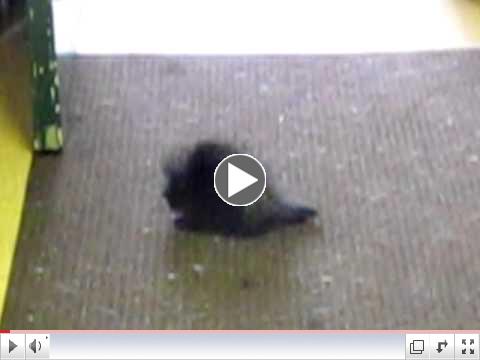Porcupines are found across all of Pennsylvania. The third largest rodent in the world, they spend the majority of their lives climbing trees to eat the tender leaves and bark found on new branches. They have thousands of very sharp quills around their face and back, which they use to defend themselves. Newborn porcupines, called porcupettes, are born with these quills, which are hard and sharp within 30 minutes! Contrary to old wives' tales, they are not able to "shoot" their quills at a predator. Rather, each sharp quill has a tiny barb on the end that burrows very easily into an attacker's skin. As they get older, the quills take on a black and white coloration. Just like skunks, this coloration serves to alert other animals that it is better to keep their distance!
 Our new ball of spikes arrived at the Wildlife Center when he was just two weeks old. We purchased him from a specialty breeder for our education program. When Irwin first arrived, he was very scared. At every new noise, whether it was the faucet, a door opening, or even someone whispering, he would curl into a ball and point his quills up to protect himself. Even though he is very small, we still have to be careful of those sharp quills. In the beginning, many of us got a handful! Now that he has relaxed, he is able to tighten his skin and pull his quills tight against his body so he does not accidentally stick anyone.
Our new ball of spikes arrived at the Wildlife Center when he was just two weeks old. We purchased him from a specialty breeder for our education program. When Irwin first arrived, he was very scared. At every new noise, whether it was the faucet, a door opening, or even someone whispering, he would curl into a ball and point his quills up to protect himself. Even though he is very small, we still have to be careful of those sharp quills. In the beginning, many of us got a handful! Now that he has relaxed, he is able to tighten his skin and pull his quills tight against his body so he does not accidentally stick anyone.
Irwin, like his wild relatives, is a great climber. He has hooked claws that are great for grabbing branches and bark. Because porcupines live in trees and love to eat the new leaves and buds in the smallest branches, they sometimes fall to the ground. Luckily, porcupines have a natural antibiotic in their skin so that if they injure themselves on their quills, they will be able to heal quickly.
 |
| Irwin plays in the office! |
Also like his wild relatives, Irwin has a serious salt tooth! Porcupines love the taste of salt and will often chew anything that has salt on it, including canoe paddles, doorknobs and even hiking boots left outside. This salt preference has earned them the nickname "Old Salt Tooth" and the reputation as a pest in some areas.
Because Irwin will live with us permanently, he gets plenty of socialization. He loves to spend his days being cuddled, stealing elastics from ponytails, climbing up shelves, chasing his tail, and snoozing in his hammock. He is already very well socialized and looking forward to going out on education programs in the future to teach people about wildlife rehabilitation and coexisting peacefully with wildlife. Click on the video to the left to watch Irwin playing by himself in the office!